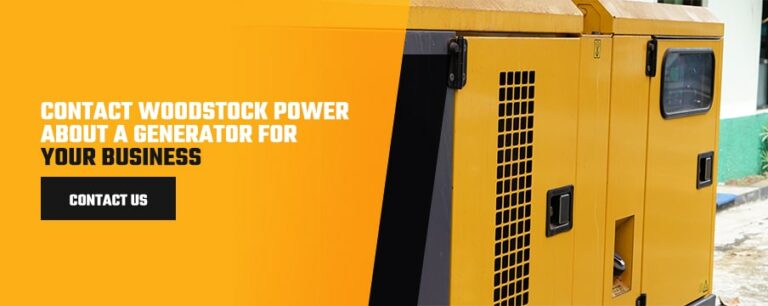A Guide to Backup Generator Installation for Businesses
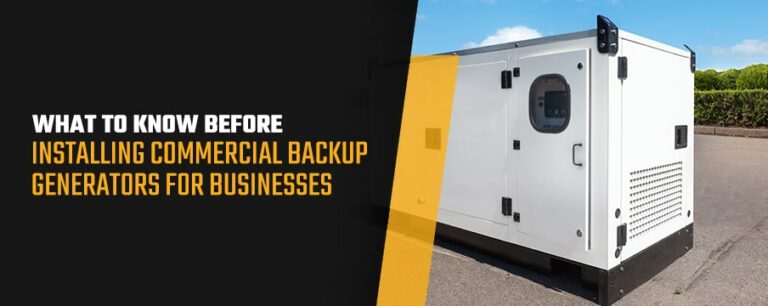
Don’t let a power outage cost your business profits or productivity. There’s no telling when a severe storm or downed wire will impact your property, so you need to be prepared to ensure your company continues to run as smoothly as possible. A commercial backup power supply is your best bet.
These generators, which can come in both diesel or natural gas configurations, are robust backup power solutions for any business, facility, operation, or commercial/industrial application that requires constant power to continue day-to-day business operations. When energy loss occurs due to a power outage from natural disasters, interruptions in the power grid or component failure, your generator will keep your company up and running until the main power source returns.
Because installing a backup generator for commercial purposes is no simple task, you should note a few points beforehand to ensure the process happens smoothly.
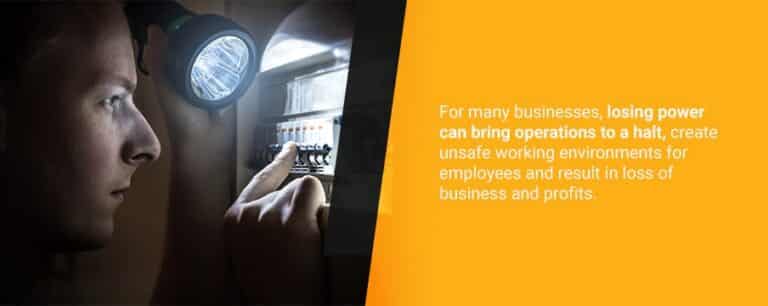
The Importance of Backup Power Generators for Business Operations
For many businesses, losing power can bring operations to a halt, create unsafe working environments for employees and result in loss of business and profits. Whether you operate a college campus or a construction site, you can run into many issues when the power goes out. That’s why generators are essential for commercial purposes.
There’s no single cause of a power outage. These incidents can occur due to natural disasters — like hurricanes, tornadoes, earthquakes and floods. Many external elements cause power outages, including power grid failure, utility pole accidents, transformer malfunctions and even your friendly neighborhood squirrel. No matter what leads to the power outages, if your business or operations rely on constant electricity, power outages can cripple your workflow and processes.
These disruptions can last anywhere from a few minutes to days. Therefore, businesses need to be prepared for short and long-term power outages to keep their facilities running. In many cases, companies are forced to wait around until power to the main utility grid is restored before being able to resume business operations. Any period of downtime can result in fewer profits — and for places like hospitals and nursing homes, it can be the difference between life and death.
Installing a backup generator can keep the basics of your facility running to perform regular daily operations, making power outages a nuisance rather than a setback in business profits, productivity or dangers to lives.
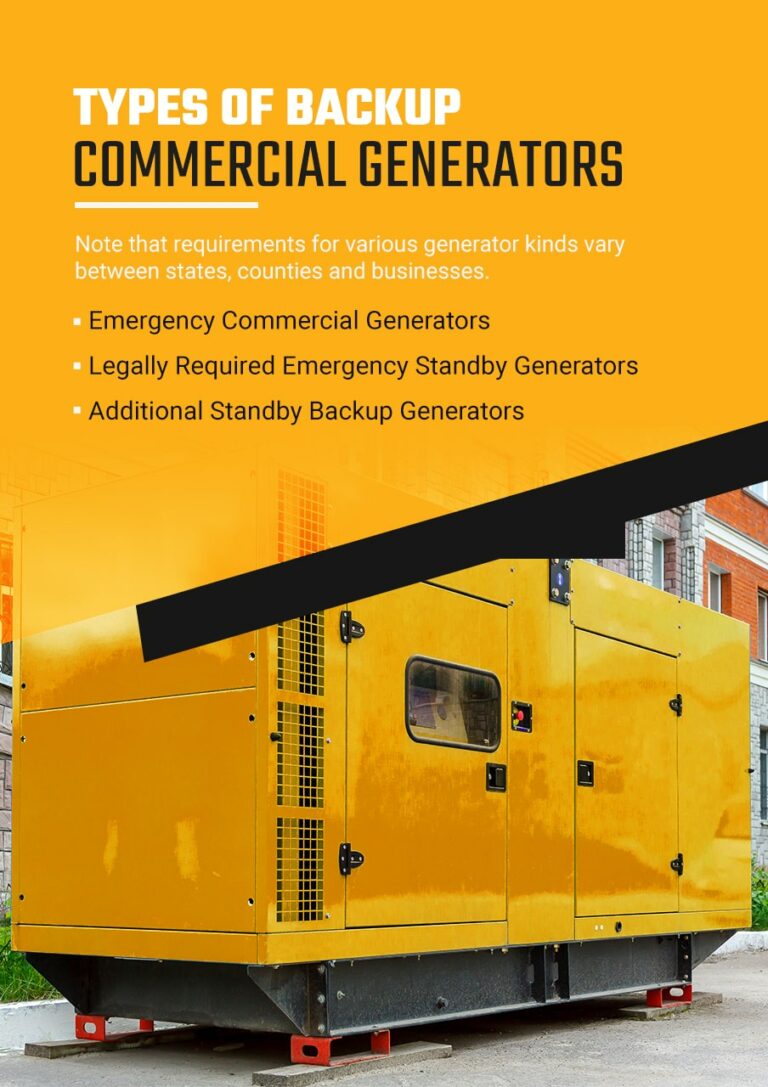
Types of Backup Commercial Generators
Commercial generators fall into three main categories — emergency commercial generators, emergency standby generators and additional backup generators. However, two of these are NFPA 110 standard requirements. These types of generators provide backup necessary for providing key loads. Note that requirements for various generator kinds vary between states, counties and businesses.
1. Emergency Commercial Generators
These backup generator systems automatically provide backup power in the event of power loss due to a power outage. You can find different types of emergency power supply systems in the NFPA code. These units must provide power within 10 seconds to all safety systems, which commonly include:
- Exit lighting
- Smoke alarms
- Evacuation systems
- Fire alarms
- Escalators
- Elevators
These safety features allow occupants to leave safely and quickly during life-threatening situations. Under this category, they can’t rely on other power sources, instead operating as standalone generators and having their own panels, switches and conduits.
2. Legally Required Emergency Standby Generators
Standby generators for emergencies differ from emergency units in the time allowed before they begin to provide power. These generators must activate within 60 seconds of a power loss. Like with EPSS, standby generators also fall under the NFPA code as a required device for some businesses.
However, unlike EPSS, which must have separate connections, standby systems don’t require that feature. These generators don’t provide power to safety features, primary egress systems or life-saving devices. That said, they can improve egress from the building for people inside.
3. Additional Standby Backup Generators
Any additional standby backup generators for commercial buildings aren’t a requirement by code. But these additions can power key equipment, machinery and any other systems the business needs to continue regular operations in the event of a power outage. Essentially, these backup generators can help mitigate profit loss and losses due to downtime.
Additionally, these generators can help keep heating and cooling systems running to provide continued comfort for all occupants if desired. These generator systems can also connect to the same system components as the standby generator systems required by law, but not the emergency generator systems. For businesses that rely on stock or inventory that needs to be temperature controlled, a backup generator can help keep cooling and refrigeration systems running to prevent potential spoiling of perishable goods.
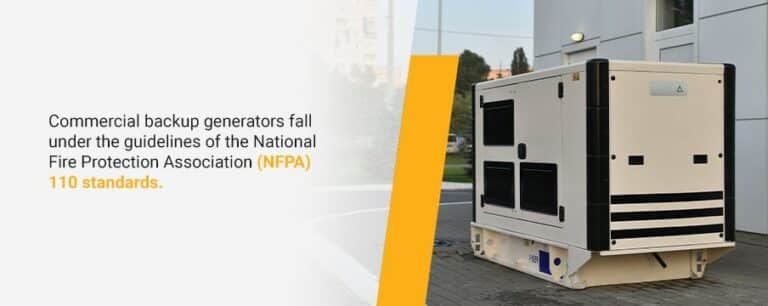
What Are the Requirements of Commercial Backup Generators?
Commercial backup generators fall under the guidelines of the National Fire Protection Association (NFPA) 110 standards. These standards mandate the minimum types of generators, operation and testing requirements for these units.
The types of generators you browse depend on what tasks your business performs. For instance, Level 1 emergency power supply systems (EPSS) are required for situations in which power outages could cause loss of life for employees or clients.
Level 2 EPSS are used for less critical situations where lives aren’t at risk. As with Level 1 EPSS, Level 2 EPSS has all the accessories to keep the generator running. These accessories may include controls, transfer switches, load terminals, alarms and overcurrent protection.
Mission critical facilities are operations that provide crucial functions for a business’s aims. Sites that fall under this category include hospitals, data centers, university research centers and laboratories. Power losses in these places could compromise information in servers or specimens in laboratory storage.
To ensure your business meets the necessary requirements, consult with a professional in backup generator installation who knows the NPFA 110 standards and how they apply to different businesses. For example, restaurants and mental health facilities have separate requirements under the standard for their emergency generators.
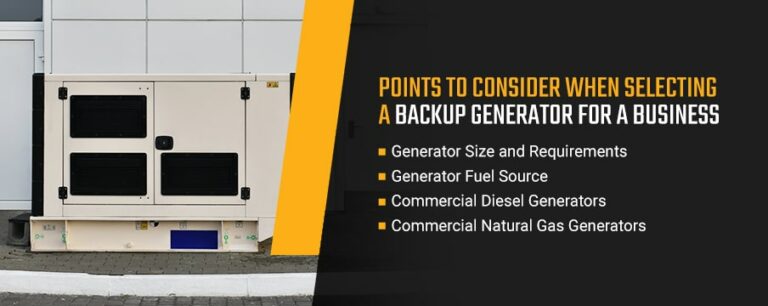
Points to Consider When Selecting a Backup Generator for a Business
Whether you need to protect your health facility’s HVAC systems to keep patients safe or ensure your data center remains secure, you can benefit from a generator for your business. But where do you begin? This process can be a bit tricky, involving research on the power needs for your business. Plus, you must consider the type of fuel source to use and where to install the generator.
Because the process requires careful calculations, you should consult with an expert in commercial generator installation for assistance finding recommendations that will fit with your business needs and budget. Here’s a closer look at generator sizes, requirements and fuel.
Generator Size and Requirements
Commercial generators come in various different ratings. With such a range of options, you need to carefully consider the appropriate size for your business. Though you don’t want to undersize the generator because it won’t produce enough power, you also don’t want to purchase a generator that produces too much power because you could waste money on power generation you won’t use.
As with other decisions, you’ll want to consult with a generator professional to get advice on the exact size your business needs.
Generator Fuel Source
The most common fuel sources used for commercial generators are diesel and natural gas/LPG. Because each has advantages and disadvantages, neither is inherently better than the other. You must make a decision based on your company’s needs and the availability of fuel for the generator.
Commercial Diesel Generators
Diesel generators are one of the most commonly installed generators in the market for emergency backup power and standby generator selections. Their versatility means various industries can use them for different needs. Additionally, these models require less overall maintenance, so you may be able to save money in the long run.
The drawback to diesel generators is how the capacity of their fuel tanks restricts their maximum operating runtime. Therefore, you should have a plan for providing fuel to refill the tanks. Don’t rely on fuel trucks, which may not be able to reach your business after a natural disaster or emergency. As an alternative, you could use external diesel fuel tanks stored on-site in case of an emergency to replenish the generator’s fuel supply. This second option allows for preparation for long-term outages that often occur after hurricanes or blizzards.
Commercial Natural Gas Generators
Natural gas generators are another popular generator choice, especially in urban environments. These models generally produce less noise, and the fuel burns cleaner than their diesel counterparts. Another advantage natural gas generators have over diesel models is their capability to connect to local natural gas lines. Therefore, you don’t need to store extra fuel.
However, natural gas generators aren’t perfect. Due to having spark-ignitions, they require more frequent maintenance than diesel models. Plus, if utility companies shut off the gas supply due to a natural disaster, the generator will no longer work. However, you can work around this disadvantage with a conversion kit, which allows you to run the natural gas generator on liquid petroleum gas (LPG or propane) in an emergency. With a conversion kit, you can store extra propane on-site to keep the generator operating even if local utilities fail.
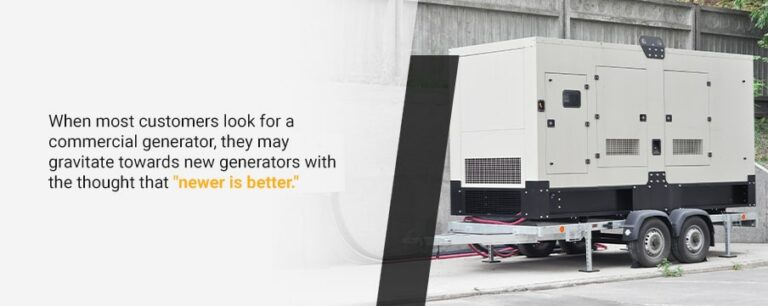
What’s the Difference Between New and Old Generators?
New Generators
When most customers look for a commercial generator, they may gravitate towards new generators with the thought that “newer is better.” Those who can afford the cost of a new generator will enjoy many benefits. That said, you should also note that even new models have disadvantages.
The benefits of new generators include:
- Latest make and model
- No wear
- Manufacturer warranty
- More recent EPA compliance
The downsides of new generators are:
- Made to order, which results in a longer lead time
- Higher cost of acquisition
- Less flexibility for modifications
- Fewer aftermarket parts available
Used Generators
If you want to spend less on a generator, you can still have peace of mind with an older molder. Often times, used generators are just as reliable as new generators, working to keep your business running for years to come.
Used generators are a popular choice for a number of reasons, including:
- Immediate availability, which leads to a short lead time
- Faster purchasing processing, delivery and installation turnaround time
- A wider selection of generator brands and models to browse
- Various upgrades and aftermarket add-ons available
- Serviced, tested and certified to run in top condition
- Can be used in many emergency standby applications
- Savings on upfront costs
That said, you should note that buying a used generator often means that it already has some wear and tear, which could be a factor in your decision.
The downsides of used generators are:
- Generator will have varying hours of use
- May require more immediate service & maintenance
- May not meet certain EPA level requirements
- May have cosmetic defects
- No brand manufacturer warranty
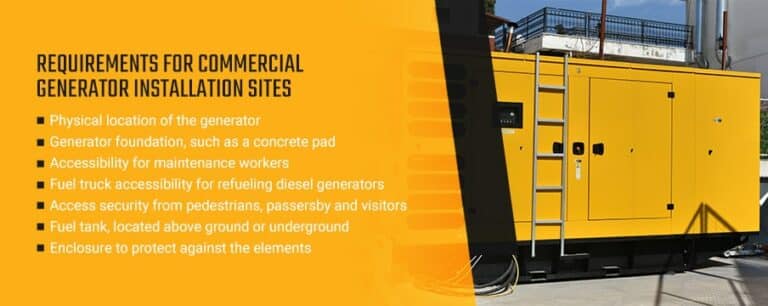
Requirements for backup Generator Installation Sites
When installing a commercial generator, each installation site will have different requirements. However, they share common features generally required in generator installation. Some of these items include:
- Physical location of the generator
- Generator foundation, such as a concrete pad
- Accessibility for maintenance workers
- Fuel truck accessibility for refueling diesel generators
- Access security from pedestrians, passersby and visitors
- Fuel tank, located above ground or underground
- Enclosure to protect against the elements
If the generator is inside a building, known as a generator room, it’s important to properly prepare the room to ensure the generator is secure and there are proper measures taken to protect the generator. It’s also crucial to adhere to local building codes, including fire codes and local emissions regulations. Be sure to consult with an expert to help guide you through the necessary steps and paperwork required to install the generator.
Questions to Ask Before Installing a backup Generator
Before choosing a backup commercial generator, you must make several decisions to ensure the unit will perform as needed in emergencies. Answers to questions about power capacity, initial costs, fuel prices and accessories will all play roles in the final choice of a generator for your business.
1. What Amount of Backup Power Do You Need?
Use your company’s electric bills to determine the amount of backup power your generator should produce. Look at energy use for the past year and find the highest amount. Add one-fourth of your power use to the number you find to see the minimum amount of power your generator should produce. The addition of one-fourth of the highest amount of power ensures your system has adequate reserve power, even when your facility operates at its peak from the electricity produced by the generator.
When calculating the amount of backup power you need, you don’t have to only look at your business’s requirements today. Consider how much power you’ll need in the future to ensure your backup generator can scale with the growth of your site. Even after doing the calculations, we always recommend consulting with an expert in generator sizing to obtain a more exact estimate of your current and future power needs from the generator.
2. What’s the Cost of a Commercial Generator?
When considering a generator, you shouldn’t base your decision solely on the price tag. Be sure to consider costs down the road, as commercial generators require regular service, maintenance and testing to ensure they’re always in proper condition.
Also, factor in the amount of money your business can save by avoiding lost profits or productivity in a power outage. Not getting a generator or choosing a lower power model to save money on the initial cost could end up costing your business more money in lost revenue from not having enough power in emergencies.
3. What’s the Cost of Fuel for the Commercial Generator?
The type of fuel for your generator will play a role in cost. Most people use natural gas and diesel, so you’ll likely choose between those two options. Due to constantly fluctuating fuel prices, you won’t be able to predict the cost of fuel in the future. It helps to look at trends, but you can never be sure, so keep that point in mind while you browse.
4. Will You Add an Automatic Transfer Switch to the Unit?
When installing a commercial generator as a backup power solution, consider investing in an automatic transfer switch, or ATS. An automatic transfer switch prompts the generator to kick in after it detects that power from the main grid has been lost. Once power from the main grid returns, the generator will then shut off.
Without an ATS, a staff member will need to be on-site to manually flip the switch. This manual switching requires paying to have someone available to run the generator in case of a power outage. Additionally, the person must also turn off the generator once the power is restored. An ATS could save this effort and time.
5. How Often Will You Use the Generator and How Long Will It Run?
When selecting a generator for your business’s emergency power needs, a stationary model that remains on standby for use is the best option. A stationary generator provides more power and can keep your business running during an outage.
However, there are times when your company may need additional, temporary power. For these situations, a portable rental generator may suffice. Often, portable models serve commercial purposes for bringing power to construction sites or other mobile needs. These units don’t provide adequate power for running the functions of a building during an outage.
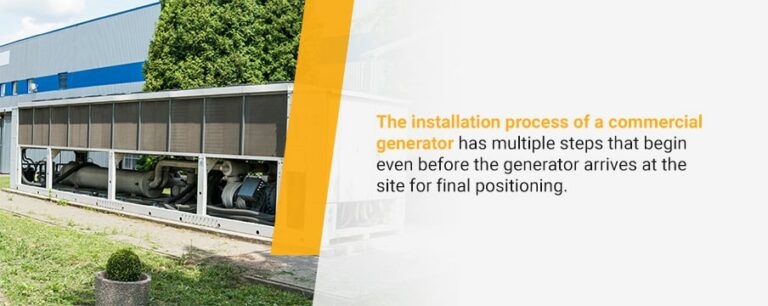
Overview of Commercial Backup Generator Systems Installation
The installation process of a commercial generator has multiple steps that begin even before the generator arrives at the site for final positioning. Pre-installation steps are just as critical as the process used to place and connect the unit. With preparation during the pre-installation period, the generator will have the correct size, provide an adequate amount of power and meet regulations.
Pre-installation steps for generator placement are as follows:
- Calculating space, size, location, fuel type, voltage and AMPS needed
- Consulting with local EPA agency and a certified electrician to ensure the generator meets local and national codes and EPA regulations
- Selecting a generator brand and model that fits your application
- Choosing a site for the generator that includes fire and safety alarms, barriers to unauthorized access and sound suppression
- Planning your concrete pad, electrical foundation and containment tank
- Obtaining local permits for the installation of the generator
Following these preparatory steps, the final backup generator installation procedure can start. During this phase, installers take the following steps:
- Installing the generator on the prepared concrete pad
- Connecting the fuel line and electrical connections for the generator
- Running and testing the equipment to ensure technicians correctly set it up
- Cleaning the installation site and removing all tools, materials, waste and equipment used
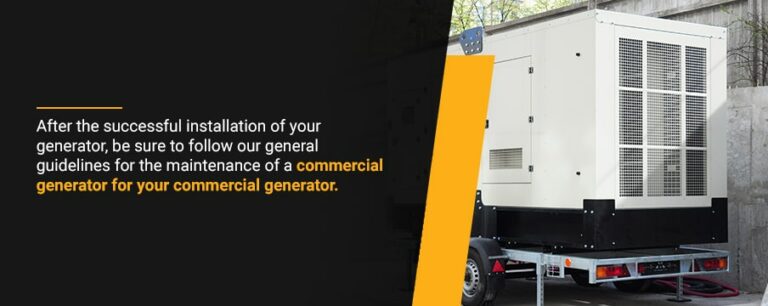
Why Service and Maintenance Matter Post-Installation
Whether new, used or surplus, all generators require constant service and maintenance. After the successful installation of your backup generator, be sure to follow our general guidelines for the maintenance of a commercial generator for your commercial generator.
As critical as maintenance is for a generator, testing is also essential for ensuring the system works as expected. Therefore, plan to test the generator’s operation on a weekly, monthly and yearly basis. Health care facilities and other sites that rely on power to prevent life-threatening health issues must conduct tests of their emergency generators at least weekly. Additionally, these businesses must do load tests monthly. Other types of businesses should do at least monthly visual inspections and annual tests. However, more frequent testing provides regular verification that the generator is ready to respond to an emergency. We advise that you always consult brand manufacturers for their recommended service & maintenance schedules as well.
With regular attention, including servicing, maintaining and inspecting the unit regularly, it’ll last you for many years to come — your business will have dependable power when you need it most. However, owning a well-maintained generator is only part of preparing for an emergency outage in your business. Always have a backup plan in case of power loss. This plan includes determining the amount of fuel needed for supplying power to the building through the emergency generator.
Other aspects of a contingency plan include sourcing and storing fuel for use by the emergency generator. Plus, you must make plans for those in the building if the power doesn’t return. Being ready for an emergency means having backup plans in case the initial plans fail.
By choosing an emergency generator that will meet your business’s power needs, keeping it maintained and accessing fuel for its use in an emergency, you can avoid many of the problems caused when the power goes out.
Contact Woodstock Power About a Generator for Your Business
While there are many items to consider and steps involved in choosing, buying and installing a commercial generator for backup power, you now know the basics of the process. By partnering with us at Woodstock Power Company, you save money on your commercial standby generators and have peace of mind to keep your facility running during power outages. Each of our generators goes through a complete process that includes inspection, servicing and verification to ensure each business has backup power they can rely on.
Our generator inventory includes a variety of options for large and small businesses. Contact us to have one of our professionals to help you choose the best generator for your business based on the fuel type, legal guidelines, space, exhaust, power requirements, prime or standby status and portability.
If you’re in the market for a backup commercial generator for your business operations, industrial applications, facilities or would like consultation and help in backup generator installation services, please reach out to us at Woodstock Power Company!


